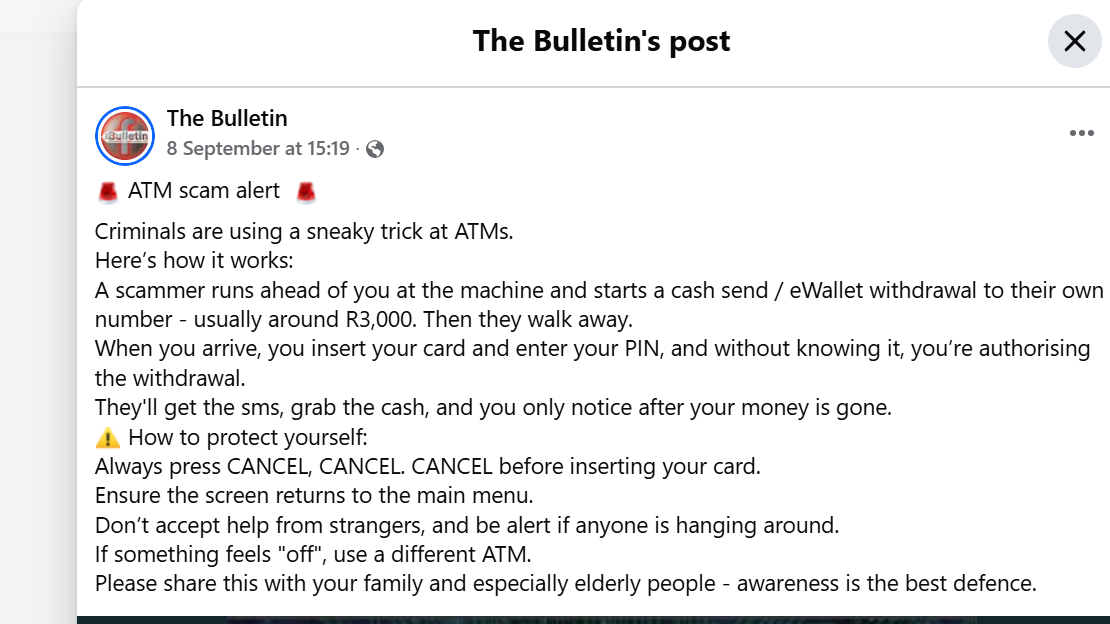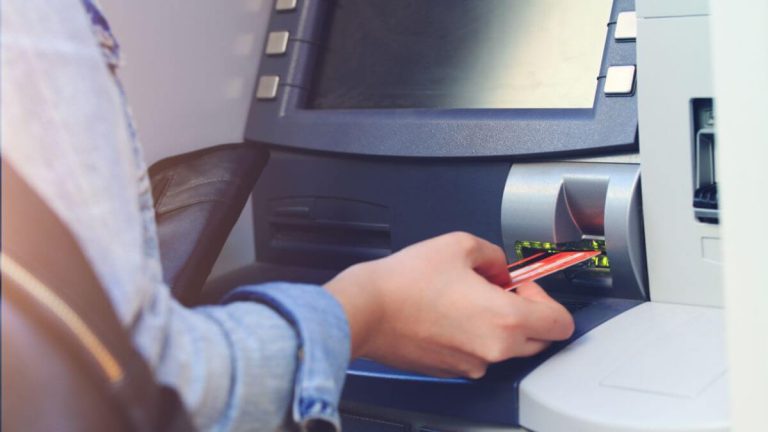South Africans have recently been warned about a supposed new ATM scam circulating on social media. Posts, especially from a Facebook page called The Bulletin, described a “sneaky trick” criminals allegedly use to exploit instant cash transfers like eWallet, Send Cash, or Instant Money at ATMs. However, after investigation, major banks have confirmed that the scam described is not technically possible on their ATMs. Instead, the real danger lies in shoulder-surfing and social engineering tactics. This guide unpacks the claims, the banks’ responses, and how you can keep yourself safe at ATMs.

The Viral ATM Scam Warning
The viral post claimed that scammers rush to an ATM, initiate a Cash Send or eWallet transaction to their own number (often for about R3,000), then walk away before completing it. When the next unsuspecting customer inserts their bank card and PIN, the transaction is supposedly “authorised,” allowing the scammers to receive an SMS and withdraw the cash instantly.
The post advised ATM users to press “Cancel” repeatedly before inserting their card to ensure they aren’t completing someone else’s transaction. It also spread widely on Telegram and other community groups, amplifying public concern.
What South Africa’s Major Banks Say
After the viral post spread, the major banks were contacted to verify the claims. Four of South Africa’s biggest banks — FNB, Standard Bank, Absa, and Capitec — said the scenario described is not technically possible on their ATMs. Here’s what they confirmed, according to My Boardband:
FNB and Standard Bank
Both banks require customers to insert their cards and enter a PIN before beginning an Instant Money or eWallet transaction. Standard Bank further explained that its Instant Money voucher redemption process is completely separate from a card transaction. Each flow has security validations and timeouts, meaning no transaction can remain open for the next customer to “complete.”
Absa
Absa stated its ATMs do not allow multiple sessions. If a session is left incomplete, it automatically times out and cancels. While a session is active, the card reader closes and no other customer can insert a card or perform a transaction until the previous session ends.
Capitec
Capitec said its Send Cash feature is a cardless transaction using a reference number and a 4-digit secret code. There is no step where a card can be inserted midway through the process, nor can a recipient choose a different amount or request a partial withdrawal.
Nedbank and TymeBank
These banks do not support starting mobile number-based cash transfer transactions at ATMs at all. Instead, customers must use mobile banking apps, cellphone banking, or browser-based banking.
The Real Risk: Shoulder Surfing and Social Engineering
While the alleged scam described in the viral post is false, the real danger at ATMs remains shoulder surfing and social engineering.
Criminals can watch or trick people into revealing their Send Cash or Instant Money reference numbers and secret codes. They can then redeem the cash in a separate session — often before the intended recipient does.
This tactic has been reported across the industry and is far more likely than the scenario described in the viral post.
How to Protect Yourself at ATMs
Although the specific scam isn’t possible, ATM users should still be vigilant. All the major banks provided important safety tips:
1. Don’t Accept Help from Strangers
Never accept unsolicited help at an ATM, no matter how friendly someone seems. Only bank staff inside the branch or call centre agents can assist.
2. Stand Close and Shield Your PIN
When entering your PIN, stand as close as possible to the ATM and cover the keypad with your hand. Criminals sometimes place cameras nearby to capture PINs.
3. Read the Screen Carefully
Only enter your PIN on familiar screens. If something looks unusual or you’re unsure, press “Cancel” and start over, or walk away and use another ATM.
4. Keep Cash and Codes Private
Treat Send Cash or Instant Money reference numbers and secret codes like cash. Don’t share them, and shield your phone screen when generating or entering them.
5. Check the ATM Before Use
Avoid ATMs that look tampered with or behave strangely. If in doubt, use a different machine or a participating retailer to collect your cash.
6. Secure Your Cash Immediately
Once you’ve withdrawn cash, place it out of sight immediately. Avoid handling large amounts of cash in public view.
Additional Safety Steps for Send Cash or Instant Money
- Prepare your code in advance: Generate your secret code in private before approaching the ATM.
- Reset the code if compromised: If you suspect someone saw your code, reset it immediately (if possible) or call your bank to block the voucher.
- Use official channels: Redeem vouchers only at trusted ATMs or participating retailers.
Key Takeaways
- The alleged ATM scam circulating on social media is not technically possible, according to South Africa’s major banks.
- The real danger is criminals observing or manipulating people to reveal their secret codes or PINs.
- Practicing good ATM habits — shielding your PIN, avoiding suspicious machines, and keeping your cash and codes private — remains your best protection.
Read more: Absa Shuts Down More ATMs in SA
While social media warnings can sometimes alert people to real dangers, it’s essential to verify claims before panicking. In this case, the supposed “ATM scam” was debunked by banks, but it did highlight the importance of ongoing vigilance when using ATMs or cardless cash services.
By understanding how these services work and following basic safety guidelines, South Africans can continue to use ATMs and instant cash services with confidence and peace of mind.




